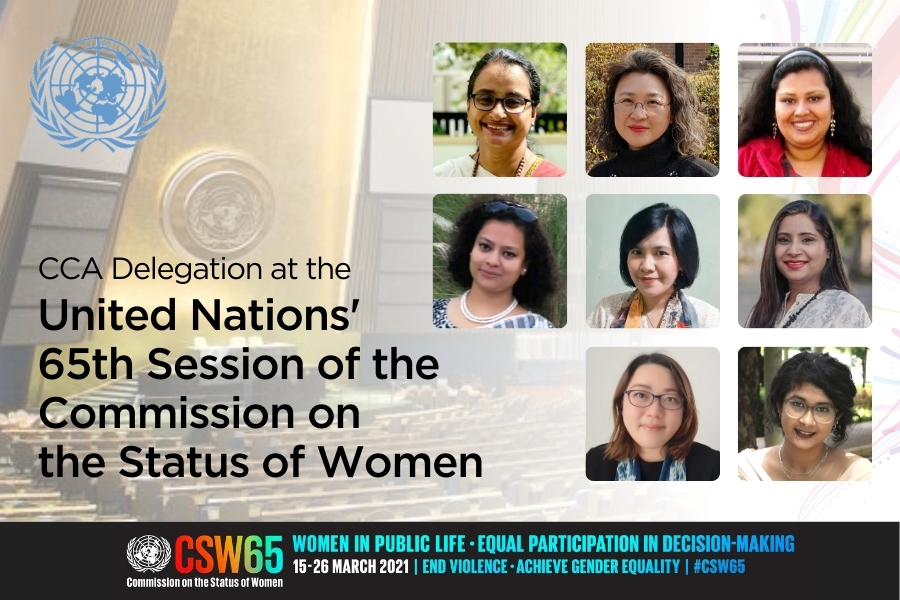CCA delegation participates in the United Nation’s 65th Commission on the Status of Women

An eight-member delegation representing the Christian Conference of Asia (CCA) participated in the 65th Commission on the Status of Women (CSW–65) of the United Nations (UN) from 15–26 March 2021.
The CSW is a global intergovernmental body that focuses exclusively on the promotion of gender equality and the inclusion of women in all walks of life. The body, officially formed in 1946, meets annually to deliberate upon the global progress made to further gender equality, identify and address challenges, and set the standards for gender-inclusive policymaking around the world.
As the COVID-19 pandemic continues to restrict physical/in-person gatherings, the CSW–65 was conducted entirely through virtual platforms this year. The virtual official deliberations and parallel events enabled the participation of accredited representatives of governmental and non-governmental organisations from across the world, making it the largest CSW ever to be held.
The CCA has been accredited with the UN’s ECOSOC since 2003. This enables the CCA to represent its member churches in Asia at different UN events from time to time.
The priority theme of CSW–65 was “Women’s full and effective participation and decision-making in public life, as well as the elimination of violence, for achieving gender equality and the empowerment of all women and girls”. The deliberations helped to analyse and discuss the theme in the context of the COVID-19 pandemic.
Focal points for many of the discussions prioritised the concerns on marginalised women and girls, especially in programme planning and resource allocation, the increasing of women’s access to power and decision-making positions, and the promotion of gender equality education, along with the elimination of all forms of violence against women and girls.
The CCA delegation attended different sessions of the meeting as well as parallel events throughout the two weeks of the CSW.
The CCA delegation to the CSW–65 comprised Rev. Kyrie Kim (Chairperson of the CCA’s Programme Committee from the Anglican Church in Korea), Prof. Dr Susan Thomas (Malankara Jacobite Syrian Orthodox Church in India), Rev. Astrid Bonik Lusi (Christian Evangelical Church Timor in Indonesia), Rev. Moumita Biswas (Church of North India), and Ms Nandita Biswas (National Council of Churches in Bangladesh), and CCA staff members Ms Sunila Ammar, Ms Rosiana Indah Purnomo, and Ms Ruth Mathen.
The events and meetings that the CCA delegation participated were centred on gender-sensitive policymaking; women’s political representation; ending violence against women in public and private spheres; empowering adolescent girls; combating child, early, and forced marriage; addressing migration and trafficking; ecofeminism and climate change; ethnic conflict and community violence; and faith action for gender equality.
Rev. Kyrie Kim reflected on the participation of the CCA at the CSW–65 and said that the CCA’s accredited delegates to this year’s UN-CSW had forged new pathways and gained substantial new insights and perspectives from the deliberations, which would help Asian church women to be engaged in advocacy on several pertinent Asian women’s concerns.
Prof. Dr Susan Thomas observed, “In a world of gender inequality and injustice, CSW–65 is a much-needed step towards getting all nations, civil society groups, and organisations of the world to commit themselves towards rebuilding a just world in post-pandemic times, which was envisaged 25 years ago in Beijing.”
Rev. Moumita Biswas noted, “The emphasis throughout the CSW–65 was on building feminist resilient leadership, especially under the shadow of the COVID-19 pandemic. Several parallel events focused on women’s resilience at all levels of participation and decision-making. It is commonly agreed that such feminist resilient leadership is the need of the hour to recover from the COVID-19 pandemic—and so, Asian churches and ecumenical organisations must take up the mandate of nurturing the leadership of women.”
Key conclusions derived by the CCA delegation from their participation at the CSW–65 include:
(1) Better recovery from COVID-19: the resilience and special gifts of women for strong leadership through and out of the pandemic must be valued and encouraged;
(2) Increased church engagement: ally-ship of the churches with women and young people must be affirmed, strengthened, and practiced in all spaces and levels;
(3) Increased dialogue and collective action: constructive and meaningful dialogue which includes listening and sharing across genders and generations must be fostered;
(4) Stronger partnerships and collaboration: nurturing and supportive environments that encourage the leadership of women must be created and strengthened by churches in collaboration with other actors of goodwill;
(5) Empowering young people: a shift from youth “participation” and “engagement” or tokenism to young people in active decision-making must occur;
(6) Increased decision-making positions: women must be entrusted with decision-making authority as they currently continue to remain underrepresented in leadership;
(7) Transformation of structures and systems: barriers to access, especially those that are gender-insensitive or gender-blind, must be identified and challenged.










